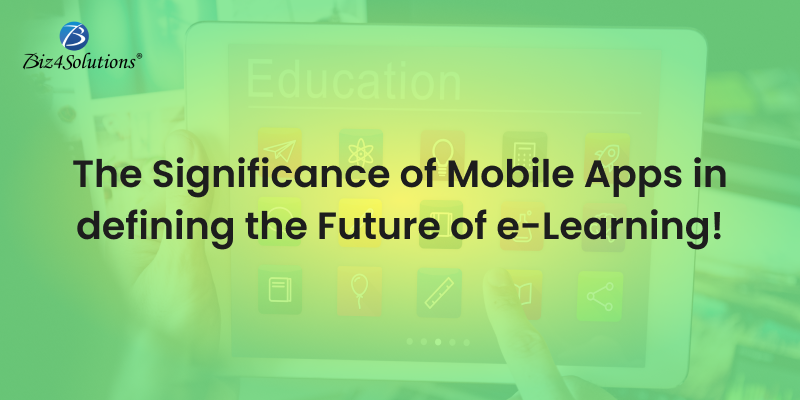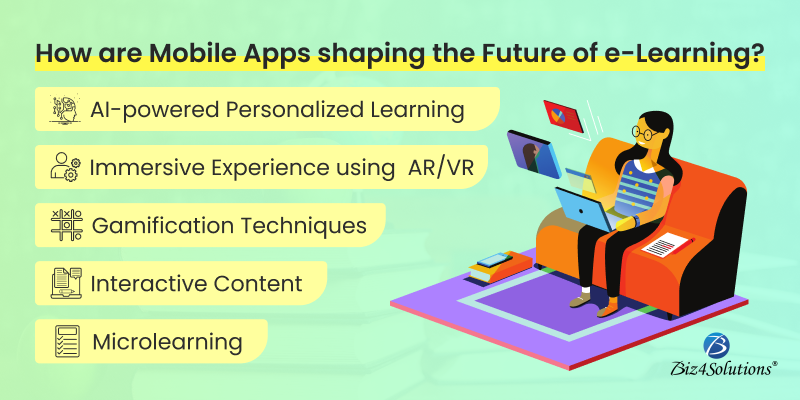
The education industry is undergoing a sea change with the rising popularity of eLearning apps. The eLearning sector is booming like never before. Peek through an interesting statistical fact stated by the popular research portal Research and Markets:
“The market value of the eLearning sector will touch US$ 350 billion by the year 2025 thanks to technological innovations.”
With multiple disruptive advantages over conventional learning, online learning is gaining momentum at a fast pace. A well-designed eLearning solution addresses several limitations existing in traditional learning and offers transformative add-ons like never before. Also, multiple disruptive technologies have revolutionized and broadened the spectrum of eLearning. Today, it has become one of the lucrative options for learners, instructors, and educational institutions unanimously. eLearning is constantly evolving and promises a brighter future for the education sector.
This post provides detailed insights about the basic and advanced features to include in a future-friendly eLearning mobile app and discusses the advantages of eLearning.
Basic Features to include in a new-age eLearning App
User-friendly UI/UX
A user-friendly interface design and a smooth user experience are must-haves for an eLearning app. An aesthetic design and easy navigation are driving factors to make an app all the more pleasing, appealing, and widely acceptable. So, avoid using complex features that are not necessary. This will cause confusion amongst users and lead them to abandon your app. Therefore, design an easy-going UI and integrate the relevant functionalities only.
Support for different Learning Formats
An eLearning application needs something more than just simple and monotonous printed lessons. Most eLearning apps support multiple course formats like podcasts, captivating pictures, audio lessons, high-definition videos, etc.
Video Lessons
Video content & live streaming are must-have features of an eLearning mobile app that makes it stand out from traditional teaching methodologies. Whether it’s a live video streaming session with the faculty or eLearning content in the form of pre-recorded videos, the impact on students is profound.
Also, video sessions are recorded so that students who have missed the session can attend the lectures at a convenient time. Recorded sessions can be replayed by learners as many times as they wish to gain a better understanding of the subject matter. Students have the convenience to pause and then replay videos resulting in improved comprehension. This approach resolves one of the most age-old challenges of conventional learning and elevates learning experiences to the next level.
Progress Report Generation
eLearning applications must provide users with instant performance feedback by generating progress reports. Such reports assess a learner’s performance from different angles like the level of understanding, the degree of exam preparedness, etc. Clear and concise reports help the students and their instructors to identify the area where the learner is struggling.
Offline Support
This feature is crucial to make an eLearning app more engaging and enhance its usability. Users may not always have access to an internet connection or may face connectivity issues at times. Learners can download educational content and access it in an offline mode. So, whenever the internet connectivity is disrupted because of a glitch or slow loading speed; the offline mode saves hassles for learners.
Multi-language Support
If your eLearning app targets global audience groups, it should support the relevant languages. An app will lose its value if users located in certain parts of the world are not able to access it due to language barriers. An eLearning app with multi-language support will be widely accepted globally and will maximize audience outreach.
Revolutionary Offerings of Modern-day eLearning Apps

Microlearning
Microlearning is a popular eLearning approach offered by mobile applications. Modern-age learners have a shorter attention span and the microlearning approach aims to address this issue. Here, apps generate bite-sized learning content so that users can consume information in the form of small-sized manageable chunks. This makes room for repetitive study and helps users to retain information more easily.
Interactive Content
New-age eLearning mobile app development solutions provide interactive content like animations, videos, audio files, quizzes, and simulations. Live tutorials and doubt-clearing sessions are highly sought-after functionalities. Such an approach facilitates interaction and communication between learners and instructors.
Coming to quizzes, you can include different formats. Some examples are filing the blank spaces, MCQs, sorting & matching to essays & surveys, etc. You can also have leaderboards, define limits for tests, include random questions, and offer interesting hints wherever needed.
Interactive content makes learning more fun, exciting, and engaging. Hence, users’ learning outcomes are more productive and they can retain information better.
AI-powered Personalized Learning
Artificial intelligence adds to the productivity of an eLearning app by delivering personalized learning experiences. AI-powered algorithms identify the specific requirements of every learner, track a student’s progress, and figure out the areas of improvement required. AI/ML algorithms also generate customized study material tailored to meet the unique interests and preferences of learners. AI-empowered apps analyze the behavior of every learner to produce such targeted content. Moreover, if a learner finds it difficult to grasp a specific concept, the app provides extra study material based on their needs. This helps the learners learn at their own pace and allows them extra time and guidance until they master a concept entirely. As such, the usage of Artificial Intelligence & Machine Learning guarantees improved learning outcomes and adds value to the teaching-learning process.
Immersive Experience using AR/VR
Virtual Reality and Augmented Reality have made their way into the eLearning landscape. AR/VR-empowered eLearning mobile solutions offer learners an immersive experience. The potential of AR/VR lies in the fact that these technologies can create an illusionary circumstance to make learners virtually experience what they are learning. A virtual immersive experience creates an everlasting impact on human brains and proves way more effective than traditional teaching-learning methodologies. It helps a student to process information faster and retain the information. Hence, AR/VR wearables assist students to grasp a subject better. Imagine a scenario where students get a virtual feel of space, historical events, or visiting various places in the world.
AR/VR solutions also provide effective training scenarios. For example, employees undergoing safety training using VR headsets would get the real feel of emergencies without having to face danger.
Gamification Techniques
Some eLearning apps even offer gaming elements for learners. Now, the question that pops up in your mind is: “Are gamification elements of any use to a teaching-learning solution?” Well, gamification is a disruptive feature that motivates users to learn better and improve their performance. But, how? Elements like leaderboards, earning points and badges for achievements, etc. add a new meaning to learning. Learners try to excel for earning rewards and faring better than their co-learners.
eLearning Mobile Apps: Key Advantages
Flexibility & Accessibility
Traditional classrooms are mostly restricted to young learners. Conventional learning methods are not much useful for learners who are unable to attend offline classes. eLearning mobile applications have resolved this limitation and brought learning out of the confines of classroom teaching. Individuals can access courses regardless of their age or availability.
eLearning mobile applications make study material available to users in the form of videos or audio on users’ smartphones. So, learners can access educational content and other resources from any place and at any time. All they need is a mobile phone and an internet connection for accessing education. For example, learners get the advantage of accessing learning material while waiting in queues, in transit, or during work breaks.
Due to such a high level of flexibility, users with super-busy schedules can adjust their study time at their convenience quite easily. This way, busy learners can access knowledge without having to disrupt their daily routines.
Peer-to-peer Collaboration
Most eLearning solutions offer the functionality of learner-instructor interaction via messaging. But, not every solution offers collaboration with other learners. Peer-to-peer collaboration is a desirable feature in an eLearning solution that modern-day mobile apps offer. Features like discussion forums, chat rooms, group projects, etc. facilitate collaboration among learners. Learners can remotely connect and interact with other learners and instructors regardless of their location. This approach promotes knowledge sharing between peers. Also, learners experience the feeling of community learning.
Self-dependency
eLearning app solutions promote self-dependency among students as well as instructors. Students have to no longer depend on school teaching to gain educational insights, extra knowledge, or study material for competitive exams. With access to eLearning, factors like a student’s inability to attend classes due to illness or physical disability, a teacher’s absence from classes, non-availability of books, or long vacations cannot hamper the flow of education.
Teachers need not depend on conventional classes to earn a living. Instructors can take classes online from anywhere at any time regardless of any barriers like mobility issues, location, etc.
Cost-effectiveness
One of the major reasons why a learner and educational institute invest in an eLearning mobile app solution is cost efficiency. Learners need not travel to conventional classrooms or buy books. This saves time and money.
An educational institute finds it immensely profitable to impart education through an app rather than traditional classroom settings. Institutes save on infrastructure costs, overheads, etc. You need not spend on traditional teaching resources like pen, paper, books, etc. A well-designed admin dashboard saves administrative costs as well.
So, education industry providers investing in eLearning app development can save costs considerably. The only expense you need to incur is a one-time setup cost at the beginning. You need to hire professional programmers who will develop a custom eLearning app based on your specific requirements. Once developed, an eLearning solution will be a continuous source of revenue generation without having to bear maintenance expenses. Also, you can upscale or downscale your business operations effortlessly as per the demand.
Closing Views
eLearning apps have transformed the way people learn and gain access to educational material. And, eLearning mobile apps have revolutionized this approach further. Now, accessing education is a finger click away. Furthermore, cutting-edge technologies like AI, ML, AR, VR, etc. are opening up new avenues never thought of before. Benefits like flexibility, accessibility, personalization, improved interaction, user engagement, and cost-efficiency; are driving factors to elevate eLearning to unimaginable heights.
The demand for eLearning mobile solutions is higher than ever before. It’s the right time to invest in eLearning mobile app development. If you would like to design a transformative eLearning mobile app, partner with a professional mobile app development company with experience in building eLearning solutions.

